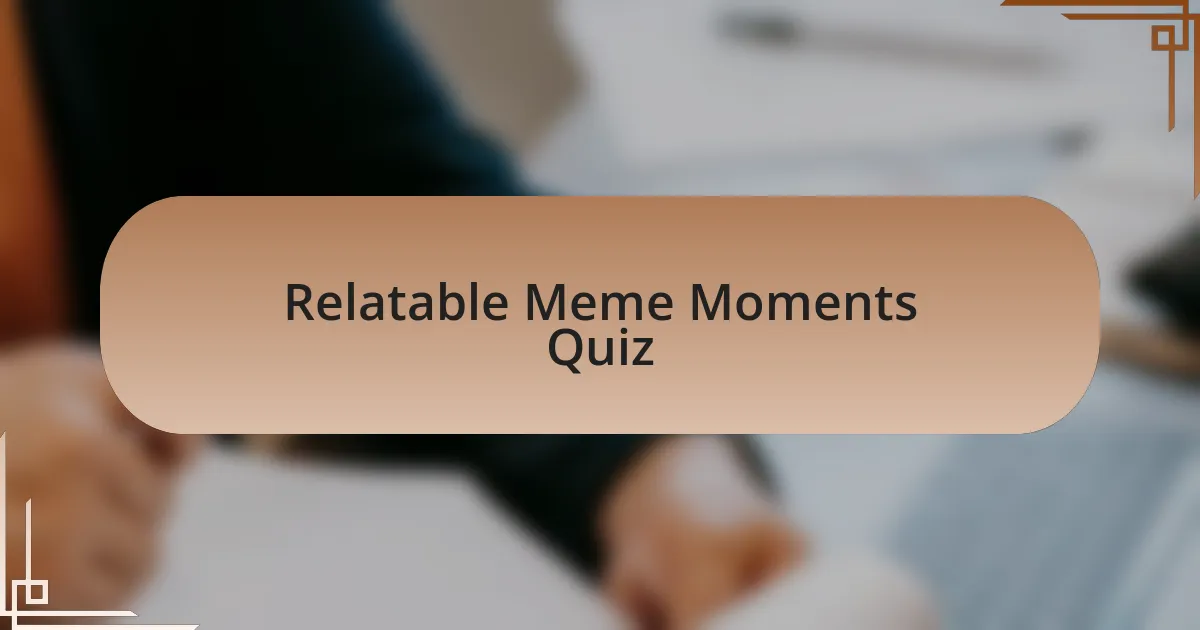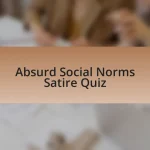Start of Relatable Meme Moments Quiz
1. What popular meme features a character from `Futurama` looking skeptical?
- Cartoon Grump
- Futurama Fry
- Disappointed Alien
- Skeptical Robot
2. In what year was the `Futurama Fry` meme first used?
- 2008
- 2011
- 2019
- 2015
3. What phrase has become popular to mock someone flexing about something trivial?
- Weird flex but OK
- Nice try showing off
- That`s impressive, I guess
- Cool brag, dude
4. What is the origin year of the phrase `weird flex but OK`?
- 2019
- 2013
- 2017
- 2015
5. Which character`s image is associated with the `condescending Willy Wonka` meme?
- Johnny Depp’s Willy Wonka character
- Jim Carrey’s Ace Ventura
- Tim Burton’s Mad Hatter
- Gene Wilder’s Willy Wonka character
6. When was the `condescending Willy Wonka` meme first circulated?
- 2015
- 2011
- 2013
- 2012
7. What does the meme featuring Jason Momoa and Henry Cavill depict?
- Jason Momoa sneaking up on Henry Cavill.
- Jason Momoa dancing with Henry Cavill.
- Jason Momoa hugging Henry Cavill.
- Jason Momoa fighting Henry Cavill.
8. In what year was the iconic photo of Momoa sneaking up on Cavill taken?
- 2018
- 2017
- 2015
- 2016
9. Which meme depicts a man blinking in disbelief?
- Dude yawning
- Person frowning
- Guy blinking nervously
- Man squinting
10. When did the `guy blinking nervously` meme gain widespread popularity?
- 2019
- 2016
- 2017
- 2015
11. What is the title of the meme that features two contrasting scenarios?
- Slaps roof of car
- Expectation vs. reality
- Distracted boyfriend
- Here we go again
12. When did the `hard to swallow pills` meme images first appear online?
- July 2015
- September 2018
- May 2019
- August 2017
13. What classic game inspired the `who would win` meme?
- Who would win
- Rock, Paper, Scissors
- Battle Royale
- Mortal Kombat
14. In what year did the `who would win` meme trend start?
- 2016
- 2012
- 2015
- 2014
15. What is the meme that involves slapping the roof of a car as a gesture of exaggeration?
- Slaps roof of car
- Kicks tire of truck
- Opens hood of van
- Lifts trunk of SUV
16. In what year did the `slaps roof of car` meme emerge?
- 2012
- 2018
- 2014
- 2015
17. What meme features an unimpressed little girl with a curious expression?
- Confused toddler
- Surprised baby
- Angry infant
- Awkward little girl
18. What year was the original photo for the `awkward little girl` meme captured?
- 2013
- 2015
- 2012
- 2014
19. What two fictional establishments are represented in the Krusty Krab vs. Chum Bucket meme?
- Krusty Krab and Chum Bucket
- Moe`s Tavern and Krusty Krab
- Diner and Cafe
- Pizza Planet and Burger Barn
20. What does the meme of Donald Trump yelling at a lawnmower boy represent?
- It represents the absurdity of frustration.
- It depicts a heartfelt moment of friendship.
- It shows a serious conversation about economics.
- It illustrates a political debate on healthcare.
21. What Facebook page is known for sharing funny and dank memes?
- Meme Factory
- Evil Thoughts
- Memes Galore
- Laughter Zone
22. Approximately how many followers does the `Evil Thoughts` page have?
- 200K followers
- 250K followers
- 154K followers
- 100K followers
23. Who is credited with coining the term `meme` back in 1976?
- Noam Chomsky
- Albert Einstein
- Richard Dawkins
- Isaac Asimov
24. In what format does the `expectation vs. reality` meme usually appear?
- Three-panel comics
- Animated GIFs
- Single-panel illustrations
- Two-panel cartoons
25. Which Facebook page focuses on relatable memes?
- Laugh Out Loud
- Funny Bone
- Relatable Memes
- Meme Central
26. How many members does the `Relatable Memes` page boast?
- 500,000 members
- 2.5 million members
- 1.4 million members
- 3 million members
27. According to a study, what percentage of younger individuals share funny memes?
- 90%
- 50%
- 75%
- 30%
28. What controversial change happened to the meme character Pepe the Frog?
- It became a character in a movie.
- It became a hate-symbol.
- It turned into a corporate mascot.
- It was banned on social media.
29. For how much was the Doge meme NFT sold in 2021?
- $8 million
- $4 million
- $2 million
- $6 million
30. What reason did Patricia Prijatel give for the appeal of relatable memes?
- Their focus on grandiose narratives and story arcs.
- Their reliance on obscure references no one understands.
- Their simplicity and ability to let people blow off steam quickly and easily.
- Their complexity and deep philosophical insights.
Congratulations on Completing the Quiz!
You’ve just navigated through our quiz on ‘Relatable Meme Moments’. We hope you found it fun and insightful. Memes have a unique way of capturing our everyday experiences with humor. This quiz has likely helped you reflect on how humor connects us and makes us feel understood. These moments in memes often mirror our lives, and that’s what makes them relatable.
Throughout the quiz, you may have learned about the evolution of memes and their impact on social culture. It’s fascinating how a simple image or phrase can evoke laughter and resonate with so many people. Each question was designed not only to test your knowledge but also to enhance your understanding of what makes humor so relatable in our daily interactions.
If you’re eager to dive deeper into the world of memes, we invite you to explore the next section on this page. There, you’ll find more information about ‘Relatable Meme Moments’ that will expand your knowledge and perhaps inspire you to create your own memes. Keep enjoying the laughter, as humor is a powerful tool that brings us all together!
Relatable Meme Moments
Understanding Relatable Meme Moments
Relatable meme moments are humorous instances captured and shared in memes that resonate with a wide audience. They highlight common experiences, emotions, or situations that many people face in daily life. For example, memes about procrastination often reflect a shared struggle to focus or complete tasks. This connection fosters a sense of community among viewers, as they see their own experiences mirrored in these humorous depictions. Relatable memes often go viral due to their ability to evoke laughter and recognition.
The Psychology Behind Relatable Humor
The appeal of relatable memes lies in their psychological impact. They provide a safe space for individuals to express feelings or experiences that may be difficult to articulate. This relatability creates a bond among audiences, as they feel understood. Humor acts as a coping mechanism for stress or anxiety, allowing individuals to laugh at shared challenges. Studies in psychology show that humor can enhance mood and foster social connections, making relatable memes especially effective in delivering both laughter and companionship.
Popular Themes in Relatable Memes
Relatable memes often explore themes such as everyday struggles, social awkwardness, family dynamics, and work-related frustrations. Common formats include images with text that exaggerate these moments for comedic effect. For instance, memes about the chaos of family gatherings resonate with many who recognize the humor in familial interactions. By referencing universally understood themes, these memes can transcend cultural boundaries, reaching diverse audiences worldwide.
The Role of Social Media in Sharing Relatable Memes
Social media platforms play a crucial role in the proliferation of relatable memes. Users share these memes across platforms like Instagram, Twitter, and Facebook, contributing to their virality. The quick sharing capabilities of social media amplify their reach, allowing relatable moments to spread rapidly. Hashtag use and meme templates facilitate easy participation, encouraging users to create and share their own variations. This interactive aspect fosters a dynamic exchange of humor within online communities.
Creating Your Own Relatable Memes
Creating relatable memes requires an understanding of common experiences and a knack for humor. Start by identifying a relatable moment or emotion. Next, pair it with a simple yet impactful visual. Tools like meme generators can help streamline this process. Keep the wording concise to enhance comedic timing. Engaging with current trends or relatable situations can increase the likelihood of your meme resonating with others, making it shareable and impactful within the meme culture.
What are Relatable Meme Moments?
Relatable meme moments refer to specific scenarios or feelings depicted in memes that resonate widely with many people. They often highlight common experiences, emotions, or humorous situations that many individuals can identify with. For instance, memes about procrastination or awkward social interactions effectively capture these universal themes, making them highly shareable across social media platforms.
How do Relatable Meme Moments impact humor?
Relatable meme moments enhance humor by creating a shared connection among individuals. They use wit to reflect everyday life, allowing audiences to see themselves in the scenarios portrayed. This relatability often evokes laughter because it validates shared experiences and feelings, making the humor more impactful and enjoyable.
Where can you typically find Relatable Meme Moments?
Relatable meme moments are commonly found on social media platforms like Instagram, Twitter, and Reddit. Dedicated meme pages and communities often curate and share these relatable memes, fostering a space where users can engage with content that reflects their own experiences and humor.
When did Relatable Meme Moments become popular?
Relatable meme moments gained significant popularity in the early 2010s with the rise of social media. Platforms like Tumblr and Facebook provided fertile ground for the dissemination of memes that encapsulate everyday relatability, rapidly spreading these humorous insights across diverse audiences and cultures.
Who creates Relatable Meme Moments?
Relatable meme moments are created by a wide range of individuals, including amateur meme creators and skilled graphic designers. Many users on social media platforms contribute their own takes on relatable situations, resulting in a collaborative meme culture where anyone can participate in sharing humor that resonates with the experiences of the general public.


